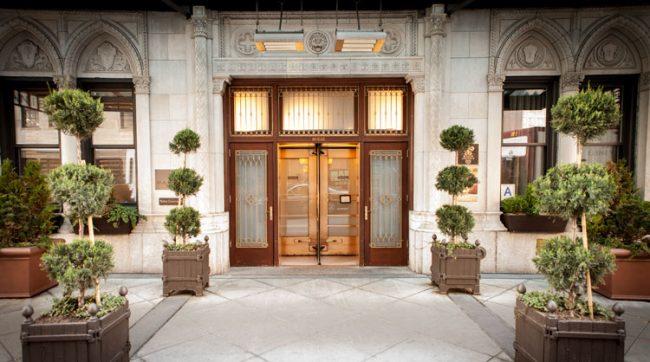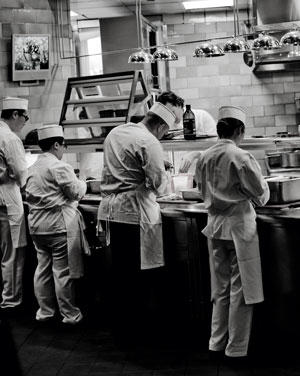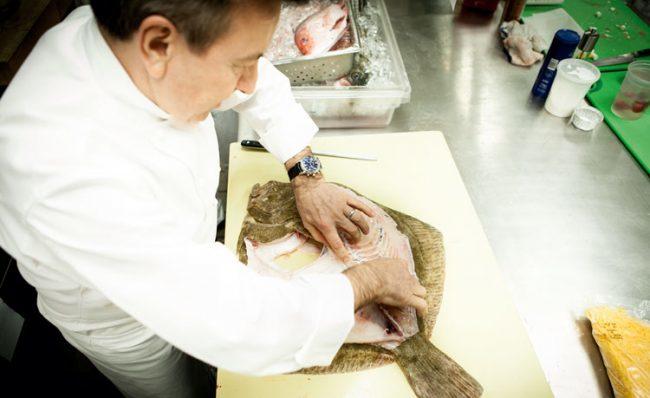Each table within the neoclassical colonnade in the dining room at Daniel, chef Daniel Boulud’s eponymous restaurant on the Upper East Side, is its own universe.
Under the double-tiered chandeliers and intricately coffered ceiling, well-groomed waiters work in pairs, bouncing like satellites from table to table in a choreographed display of precision. They swirl through the room with carts of wine, cheese and roast meat, providing unhurried table-side service. Each plate draws you into the moment.
On one evening, my dinner companion said that the ornate dining room had the electricity of a banquet hall, as if at any moment a glass might ding and throw a hush over the restaurant. I agree. The effect is simultaneously big and small. You somehow feel like the only diner in the room without ever catching the cold uneasiness of an under-patronized restaurant.
And so it has been for over two decades: deft service, inspired dishes, the pinnacle of French fine dining. Boulud has often been called New York’s longest-ruling four-star chef. Even when Daniel isn’t boasting a perfect score from the critics, it’s nonpareil in the minds of most New Yorkers. But increasingly the culinary zeitgeist has come to consider fine dining itself passé.
Boulud rejects that sentiment, confident in the lasting message of his restaurant.
“I don’t care to be trendy. I just care to be relevant with time.”
“We are very aware of what is going on,” Boulud, 61, tells me in his “skybox” — a small office and glass-enclosed dining room overlooking the kitchen. The room, along with an eight-course tasting menu, can be reserved for $1,600 for four guests. “But we don’t need to follow every trend and be what a critic wants us to be. I don’t think so, no,” he says.
“There are a lot of people who still appreciate what fine dining represents,” he adds.
But the last several years have been hard on fine dining. First, New York Times critic Peter Wells stripped Daniel of its four-star rating in 2013 — it had held four stars from 2001 to 2012. The most recent new Michelin Guide demoted Daniel from three to two stars. Then Wells took an even harder swipe at Thomas Keller’s Per Se, giving it just two stars.
Across the city, chefs young and old are choosing to open casual brasseries and bistros, with top-quality food and sky-high prices. Edgy Lower East Side restaurateurs, like Rich Torrisi and Mario Carbone, are taking over old school fine-dining institutions, like the Four Seasons’ space. It’s becoming increasingly difficult to find a restaurant in the city that even requires a jacket anymore.

The entrance to Daniel
“I was at the Four Seasons last week, and I have been going there for 30 years,” Boulud says. “This is my luxury. This is my privilege. Do I care how many stars they have? Do I care what people say? No, I don’t. I just go there because I like it.”
It is because of that steadfast loyalty to fine dining that some epicures raise their eyebrows at Boulud and have asked if Daniel can weather a culinary milieu that respects irreverence and adventure over white tablecloths. Today’s foodies have the swagger of Eddie Huang — the bao-slinging, street-talking East Village restaurateur — or Action Bronson — the obese, pot-smoking rapper whose lightly inebriated gastronomic escapades are often featured on the popular Vice-produced food show “Munchies.” Restaurants hidden behind pizza joints like Blanca in Bushwick are earning multiple Michelin stars. David Chang is known to pair his critically acclaimed courses at Momofuku with cans of cheap beer. The old school of formal dining has been mercilessly labeled out of touch, stuffy and pretentious.
“Where is the message?” Boulud asks rhetorically in regard to one highly reviewed restaurant he had recently visited. “Is it just that it’s controversial and different, so we are going to give it four stars? Sometimes I don’t get it. Frankly, I want to see them 15 years, 30 years, 40 years later. So far I’ve been here for 23 years. Thomas Keller has been cooking for almost 35 years. We are still standing. They are burning out quickly.”

Chefs work the line
I ask how he remains relevant. He tells me that his productive and tightly knit team keeps the restaurant evolving but in a way that is true to Daniel’s mission.
“I don’t care to be trendy,” Boulud tells me. “I just care to be relevant with time.”
It is obvious Boulud does care. In the kitchen the foreheads of young cooks wrinkle over perfect morsels of rabbit, trout and asparagus. They nervously salute their chef as we pass. It’s a highly disciplined brigade.
Boulud tours his six restaurants, three markets and his cocktail bar in New York City constantly, having just returned to Daniel from Boulud Sud and Épicerie on the Upper West Side for this interview. (He has five other restaurants in the U.S. and four internationally.) “I made myself a bánh mì [at Boulud Sud],” he says.
But his full attention goes to Daniel. Boulud actually lives above his restaurant, filling the building with his aura, like some sort of culinary superego. Slipshod cooks undoubtedly see his apparition in the kitchen corridors.
He says if you hear a small noise in the private dining room, it is probably his 2-year-old son Julien playing in his living room directly overhead.
“We don’t take anything for granted. It is never-ending,” he says. “Just because you have a name, you can’t walk away and chill out. No!”
Boulud began making his name in France in the 1970s. He is from Lyon and worked with France’s culinary masters Roger Vergé, Georges Blanc and Michel Guérard. As a young man, legendary Lyon-based chef Paul Bocuse made him his global ambassador.
“At 21, to be in charge of representing the brand of a chef who is world famous, I think is pretty good,” he says.
“We are very aware of what is going on.”
By the early ‘80s, Boulud was already gaining recognition in New York through his work at Le Regence in the Plaza Athénée on the Upper East Side. The Times review of the then month-old restaurant noted the skill of the “young chef.” His next stop was Le Cirque, which has proven to be a veritable hothouse for producing culinary big shots.
“Twice I brought Le Cirque four stars in the New York Times. I elevated Le Cirque. It was a very famous restaurant but not famous enough for the food. My goal was to make it famous for the food.”
To accomplish that, Boulud changed the menu, the method of cooking, the recipes and the system in the kitchen. He hired better cooks and personally trained the sous-chef.
“I worked very, very hard. I don’t think anyone today does this kind of work. It was very intense,” he says. “You start at nine in the morning and go until midnight, pushing, pushing, pushing. It is easier to criticize the chef than to do what that chef does!”
Boulud says leaving Le Cirque after six years to open Daniel was the greatest risk of his career. He had a wife and a young child to support at the time and only one investor. He says that he faced obstacles early on, especially convincing the critics that he was still a four-star chef.
“The New York Times was in limbo with their food critics [at the time I opened Daniel]. They had a couple of different people reviewing,” he says. “There was this woman, Marian Burros, who thought maybe she was a critic — everybody thinks they’re a critic. She gave me two stars.”
Burros wrote in July 1993, “What keeps this restaurant from achieving its full potential, at the moment, is not the conceptualization of the dishes, which showcase Mr. Boulud’s wonderful imagination, but their execution, which may be left too much to the members of the kitchen brigade. The staff needs work. Perhaps a visit from the sous-chef Mr. Boulud had to leave behind at Le Cirque?”

Boulud prepares a fish
“I told my team that this is the best opportunity to show them what the best two-star restaurant can be in America or in the world,” Boulud says. “If the New York Times didn’t want to give me the proper review, then I don’t care. I keep cooking. I keep doing what I do for my customer.”
By December 1993 Daniel was named “one of the 10 best restaurants in the world” by the International Herald Tribune — a now defunct publication owned by the Washington Post and the New York Times. Later that same year Ruth Reichl at the Times gave Daniel four stars.
Today Boulud is once again facing the challenge of shifting tastes. But he’s confident that creative and open-minded contemporary French cooking has the staying power to outlast the chic young competitors du jour.
“Everyone is going to grow old and appreciate what was then. They’ll say, ‘Oh god, why did it go away!’ That is why I don’t mind going through the wave. You should see the restaurant. The energy, the youth! To me fine dining is not about the pomp and circumstance; it is really about the privilege of a very, very special experience or moment. It is not about teaching people a lesson or anything. It is the food that is most important.”
At the same time, Boulud is traveling and expanding his empire. Épicerie Boulud, a 2,000-square-foot gourmet market with a similar menu to the Uptown location, will soon open in the Santiago Calatrava–-designed Oculus in the Financial District. He’s even crafted the in-flight menu for Air France, where La Première and business class guests on flights from the U.S. to Paris can enjoy food inspired by the “warm spices and flavors of Morocco, the Basque country,” as well as “Provence, the far East and beyond.”
At home he’s enjoying a refrigerator packed with fresh vegetables, anchovies, sardines, dry Spanish jamon Ibérico and his collection of Japanese pickles.
“They are not as pickle-y as the French pickles and not as sweet as the German pickles. They are sometimes colorful. They use a lot of daikon radish, sprouts and bulbs. It is interesting,” he says.
And of course, Champagne:
“I have a bottle of Cristal I got for my birthday. I don’t drink cheap. Even in the category of Beaujolais or in the category of something affordable, I don’t want the cheapest one; I still want the good one. It doesn’t have to be expensive, just well made.”
Boulud seems to be enjoying life at a time when it’s natural to step back and taste the fruits of your labor. Yet he says that he has never stopped innovating with his team of trusted cooks, many of whom have stood by his side for decades.
“Frankly, if anyone depends just on me, I don’t think the restaurant will be the same,” he says. “When you work for a great architect, you have to have a sense of what the architect wants and execute that. Not every architect draws every building. They have a multitude of talented people working with them. It is the same with a chef.”
“Do you think you will stay focused on Daniel forever?” I ask back in the skybox as we scan the evening’s menu.
“I don’t know,” he says. “But I will make sure that as long as this restaurant is here that we are true to our message. Right now it is Daniel here with me and the team and the work we do together. I think it is making people very happy.”
